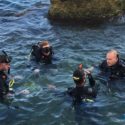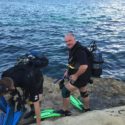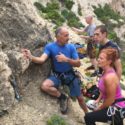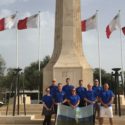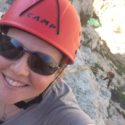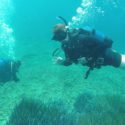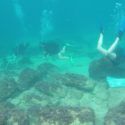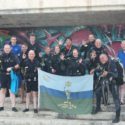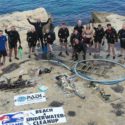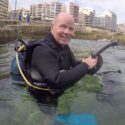Exercise Northern Gozo was an extremely successful level 3 Adventure Training exercise to the beautiful island of Malta, for 14 Officers and soldiers from 32 Signal Regiment.
The aim of the exercise was to undertake two one week foundation level courses in Rock Climbing and Sub Aqua Diving, to continue to build up the amount of personnel in the unit who have adventure training qualifications. In addition it was designed to promote individual physical robustness, confidence, team work, and exercise planning. All of these aims were easily attained.
The exercise was split into two one week exercises, with week one being rock climbing under the ever watchful eye of the instructors who initially put the group through their paces learning the basics of safety on the rock, different types of knots, how to assemble the kit and harnesses safely, as well as how to undertake the important task of belaying correctly at the rock face. The group then moved onto their first rock climbs proper at the Rocks near Xaqqa. This certainly concentrated the mind as for the majority of the group this was the first time they had undertaken this type of activity. However, by the end of day one, morale was high and the group looked forward to day two at Ghar Lapsi, where the sun shone and sun block was applied in generous amounts to the whiter than white Scottish bodies which braved the golden orb in the sky. Confidence in individuals and as a group was beginning to grow, and the climbs grew steadily longer and became more technical. A dip in the sea was a welcome and much needed culmination of the days activities. Day Three of the course saw us climbing at a well known site called Weld Babu, which was a bit of a trek and a scramble to get there from the road, but it was well worth it when the group arrived at the lovely blue lagoon next to the climbing site. The climbing now was definitely pushing the group with some of the team beginning to undertake multi stage climbs, but the trust in each other and the two instructors had grown from the first day and the group all smashed these climbs. The group’s ability to select the best routes up the rock was getting far better, and the climbs were now being completed far more competently than on the initial day. Once again a dip in the sea at the end of the day was a welcome finale to a great day’s climbing. Day four saw the group back at Weld Babu, but this time to try the most technical climbing so far up rock faces graded 5A and 5B. The group had to work hard as a team to get everyone to achieve getting to the top of all of these climbs, but the spirit to achieve the aim was there in abundance and it was with a feeling of elation that everyone got to the top of all the routes which they were set. The final day of rock climbing was learning about how to put in anchors, looking after the environment, which we now understood more having climbed in such beautiful locations, keeping logs of climbs and kit management, such as logging the use of ropes and equipment care and repair. The groups achieved their aim and seven members of the team achieved the Rock Climbing Single Pitch award.
The middle weekend of the exercise saw the group undertake a number of historical visits to the War Rooms in Malta, a tour of Valetta by day and by night, learning the history of the Island from the time of the Knights of St John to the present day. This phase of the exercise was organised and run by Mark Lane. This was a fantastic couple of days, and everyone who went on the exercise appreciated the sacrafices that the islanders went through during World War II, where the island was awarded the George Cross for Gallantry.
Week two of the exercise was the Sub Aqua Phase and this was conducted using a local company called Dive Shack, who were a Military Approved Centre to run Sub Aqua on behalf of the Army. The majority of the group were undertaking the PADI Open Water course, although some, such as Debra Yourston was undertaken the Advanced Open Water course, and Mark Lane and Louisa Kirk were taking on more complicated courses such as the PADI Rescue Diver course.
The chief instructor was called Justin Meyers, and he undertook daily briefings on the dive sites which would be used that day. The groups split up then to go to their various instructors. The novice divers had to undertake a number of videos and lessons before they could be let loose on physically getting into the water. These included lessons on underwater safety, what to do if a diver becomes distressed, kit management, emergency ascent procedures and medical issues on the surface. After this the groups then began their first confined water dives in the small bay adjacent to the Diving Centre. This was in about 5 meters of water and consisted of skills and drills such as mask clearing and removal, replacing the regulator, buoyancy underwater and on the surface. By the end of the first couple of days, the confidence and team work within the groups was evident for all to see. Day three and four saw the groups move from the local area to a new dive site at Cirkewwa which was the group’s first “dives” proper, to such exotic sounding places such as the Madonna and Snow White and the Dwarfs. Here they really practiced their skills and drills, learning to work as buddy pairs, practicing their hand signals, air management, navigation and identification of wildlife. At the end of day four Ross Keddie, Chris Crawford, Charlene Geddes, Terry McVey and Philip Golden were all pleased to learn that they had passed their Open Water course.
Day five of the diving course was a chance for us as a group to undertake some conservation work around the dive site we had been using. The whole group came together and undertook a Dive Against Debris, which is actually a recognised PADI qualification which the group all gained as part of their efforts. The day began with some lectures on why it was important to keep diving sites clean, the dangers to local wildlife and the flora and fauna of mans’ encroachment into the seas with things like plastic bags and rubbish. We then went into the sea in small two and three man teams and for the next hour or so cleaned up a section of the local diving site. It is amazing that after this short period of time, the team managed to clear up approximately 200kg of rubbish from the sea floor, with things such as a set of metal steps, piping, beer bottles, and clothing. This was a fantastic effort, well worth undertaking and it definitely gave everyone a sense of achievement.
All those who undertook this fantastic trip would like to thank the Ulysses Trust, without whose support it would have been far more difficult to have undertaken this experience which expanded all who undertook it.

